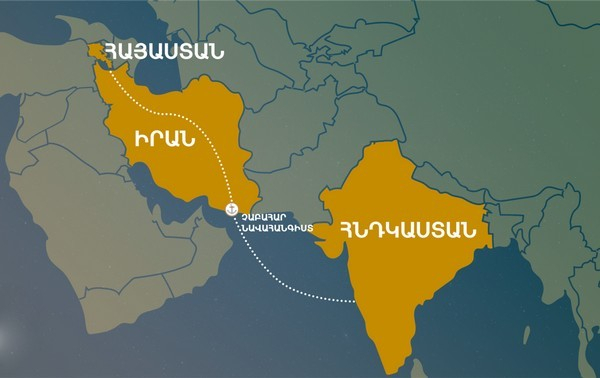ANALYTICS
04.01.24 17:15

The Indian Ambassador to the Republic of Armenia, Nilakshi Saha Sinha, emphasized the foreign policy importance of Yerevan for New Delhi, stating that 'Armenia is our reliable partner in the South Caucasus.'
Despite the ever-increasing arms supplies from India to Armenia, the statement is not merely a formality. This is especially true given recent issues that have arisen on traditional transit routes linking India and Europe, which seem to have occurred 'by a strange coincidence' or 'as if by order.' In the Red Sea, Iranian proxy Houthis have disrupted international shipping, causing transit routes that were once considered exotic to become in demand again.
It has been reported that the UAE-Israel land corridor, previously promoted by India and the U.S. as a promising route for transit between India and the EU, is being extended to Egypt. It should be noted that the use of this route has increased significantly following the Houthi attacks on merchant ships.
According to The Times of Israel, Saudi Arabia, the UAE, Bahrain, Jordan, and Egypt have established a secure land route to supply Israel with necessary goods.
The new transportation route is important not only for Israel but also for the delivery of goods from India to the Mediterranean basin and further to Europe. This project is supported by the U.S. and is based on the Abraham Accords of 2020, which facilitated peace between Israel and four Arab countries: the United Arab Emirates, Bahrain, Morocco, and Sudan.
The UAE-Israel-Egypt land corridor has grown rapidly due to Iran, which is considered the 'sworn enemy' of both the U.S. and Israel. The Houthis have hardly deployed their 'activity' on maritime communications without Iran's authorization.
Iran is blocking shipping in the Red Sea with the help of the Houthis, but it does not forget about its own interests. Iran offers transit of goods from India to Europe through its territory via the port of Chehbehar. The goods can then be transported by land through Iran to reach Western markets, including Turkey, Azerbaijan, and Georgia.
Armenia is the 'main transit country' on the south-north route from India through Iran. However, due to its lack of sea access, Armenia depends on Georgia as a transit point. India's increasing involvement in Armenia's transit plans will strengthen its geopolitical interest in Georgia.
It is worth considering to what extent this aligns with Georgia's interests. India may attempt to differentiate its 'South-North' corridor through Iran and Armenia from the Middle Corridor, which already passes through Georgia, as well as the actively developing 'East-West' route. It is important to note that the Hay 'fifth column' in Georgia has been working to destabilize the country and support separatism for some time. As a result, the 'joint Armenian-Indian influence' on the internal situation in Georgia may increase.
George Kvinitadze
Read: 694
Write comment
(In their comments, readers should avoid expressing religious, racial and national discrimination, not use offensive and derogatory expressions, as well as appeals that are contrary to the law)
News feed
-
Georgian Defence Minister highlights “active” cooperation with US Defence Department
18:0026.07.24
-
Georgian PM says rehabilitation of historical Leuville Estate to conclude in 2026
17:1226.07.24
-
Culture Minister expects Georgian flag to fly, anthem played many times in Paris
16:4126.07.24
-
16:1026.07.24
-
Irakli Kobakhidze on terrorism threats: We have all the resources to oppose such plans
15:3826.07.24
-
15:0026.07.24
-
Speaker: Opposition's main goal to come into power, be puppet regime ruled by foreign forces
14:1026.07.24
-
Two missing citizens found in Svaneti
13:2726.07.24
-
13:0026.07.24
-
Georgia Global Utilities announces issuance of $300 Million Green Bonds
12:1726.07.24
-
Can Abkhazians calm down now that the law on housing in Abkhazia has been withdrawn?
11:4026.07.24
-
PM attends Sports Summit and a Reception in Paris
11:0026.07.24
-
NBG Acting President attends opening ceremony of 1st Authorised Investment Fund in Georgia
10:0526.07.24
-
18:0025.07.24
-
17:3025.07.24
-
Georgian passport advances 6 positions in int’l ranking on visa-free travel
16:4825.07.24
-
Georgian PM says “accelerating” economic growth Govt’s “most important national task”
16:0525.07.24
-
Media representatives were attacked while performing their professional duty in Tbilisi
15:3025.07.24
-
Levan Davitashvili: The construction partner of Anaklia port will be announced tomorrow
14:5025.07.24
-
NBG: National currency loans up by 785.90 million GEL, foreign currency by 180.28 million GEL
14:0525.07.24
-
13:3025.07.24
-
12:4825.07.24
-
Defense Minister: Increasing funding annually to strengthen defense capabilities
12:0325.07.24
-
11:3425.07.24
-
11:0525.07.24
-
10:2825.07.24
-
Iago Khvichia - The investigation started in SSS is based on conspiracy theories
18:0024.07.24
-
Until July 28, there will be occasional rainy weather in Georgia
17:3324.07.24
-
NDI is launching a long-term assessment mission for the 2024 parliamentary elections
17:0024.07.24
-
16:3524.07.24
-
Kakha Okriashvili about GD - Double and triple play will lead to war
16:0124.07.24
-
15:3024.07.24
-
Occupiers will 'burn' Abkhazians 'with a hot iron' for their 'Russophobia
14:5524.07.24
-
State Budget Received Record Revenue From Gasoline And Diesel Excise Tax
14:1024.07.24
-
13:0124.07.24
-
12:4124.07.24


